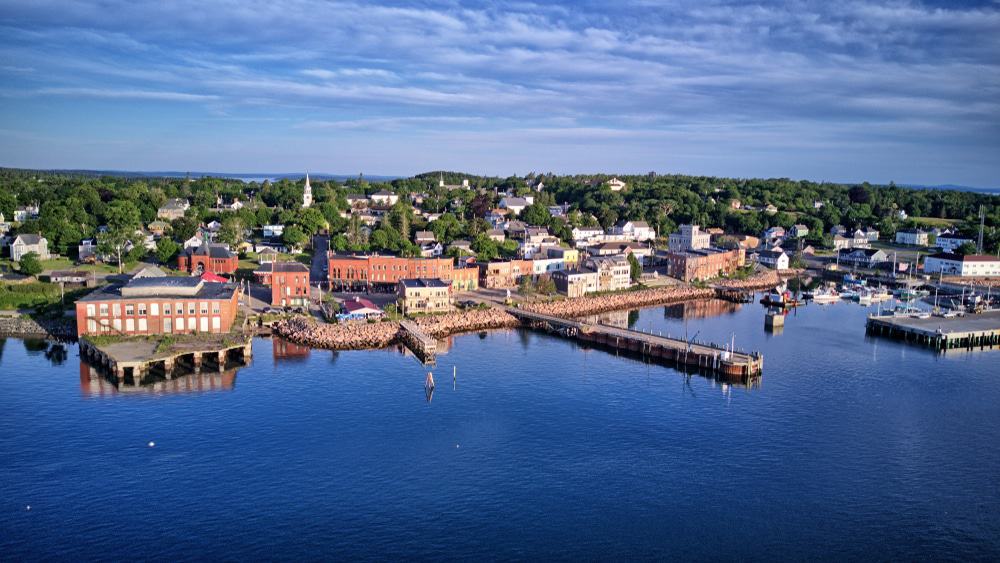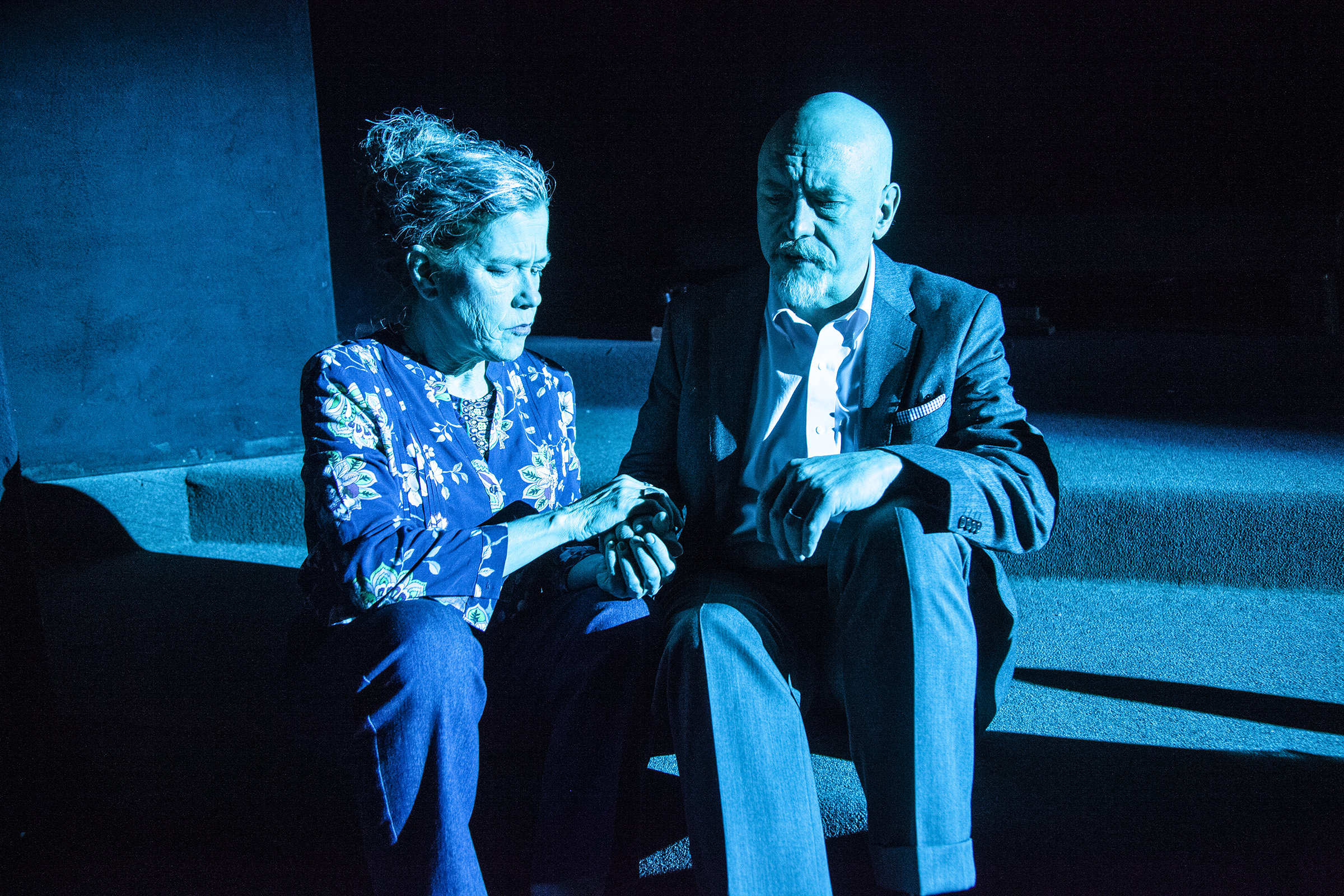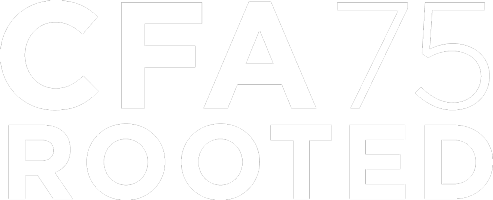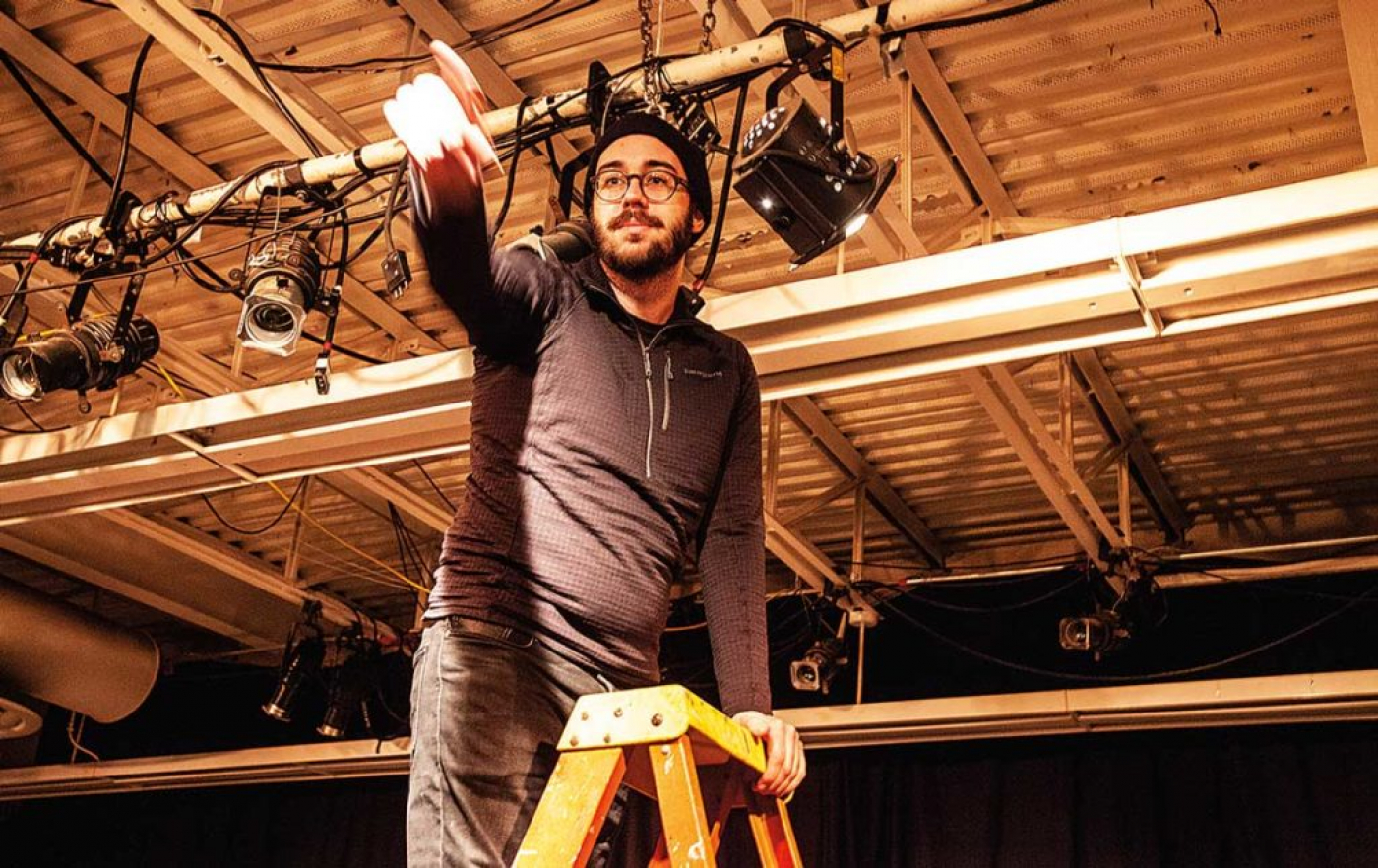MAKING ART WORK is a series that taps into the knowledge and experience of seasoned creatives from our community and beyond for the benefit of our students.
Mark Macey is the Artistic Director of Stage East in Eastport, Maine and an alumnus of the University of Utah Department of Theatre. Prior to his current role, he served as the Performing Arts Fellow for the Eastport Arts Center. With a focus on community-building and theatrical experimentation, Macey sees his work as a continuation of the Little Theatre and Regional Theatre Movements. He holds a BA in Theatre Studies, and is a graduate of Dell’Arte International’s Professional Training Program. When he isn’t in the rehearsal room, he enjoys pretending to be interviewed by Terry Gross.
How did you find your way into theatre, and what were your initial hopes for your career when you started your undergraduate degree?
I got into theatre through the 6th grade play at my elementary school. Every year they did a Shakespeare play, and my year it was “Midsummer Night’s Dream.” I hadn’t really had a good outlet before then. I wasn’t very good at sports, and socially I was a little bit awkward, but the play gave me an opportunity to shine as the weird kid that I was. I got to play Bottom.
When I first got into undergrad, I was really just aspiring to try and work as an actor. I think I was hoping to do repertory stuff and work in some equity houses. I didn’t know of anything beyond that. I had a pretty limited view of what was possible, and that seemed like the path I was on at the time.
I attended the University of Utah’s Youth Theatre Program, and met some people that I felt like I could emulate there. But I didn’t really have any mentors at that time, and that was a big part of what was great for me about my undergraduate experience, was finding those people.
How did you move into Theatre Studies? Any mentors in particular that helped you clarify your interests?
I was in the Actor Training Program, which I really enjoyed. But at a certain point I decided that I wanted to be a part of theatre that was a little less intellectual and a little more physical. It was Jerry Gardner, movement director for the Actor Training Program, who suggested I check out the summer program at Dell’Arte International. I went and did that, as well as the Professional Training Program there. When I came back to Salt Lake, I actually ran into Sydney Cheek-O’Donnell at the birthday party of another professor, and she persuaded me to come back and finish my degree as a Theatre Studies student. I had taken some courses from her and really loved them. She didn’t have to twist my arm too hard.
So my time back at the U was melding these two interests – the physical and the theoretical. It’s given me an interesting way into the working world being both dramaturgical and physical.
And what was Dell’Arte International like?
Dell’Arte is essentially a Lecoq based school, founded by Carlo Mazzone-Clementi and Jane Hill. Carlo had been touring in Italy and France doing Commedia and also many kinds of mask work, movement and dance, and observation of the natural world – seeing how what’s happening “out there” can be brought into the theatre and into the body.
It’s an international program, so you get students from all over the world – which is one of the things that really appealed to me. There is the Professional Training Program, which is the first year of the master’s. It’s a parallel program for people who don’t have undergraduate degrees. So the first year everyone is together. You move through a lot of physical and gymnastic work, then mask work, then you do things like melodrama, and Commedia of course.
It can be intimidating, but don’t stay in your lane. Branch out. Try different things and don’t wait for somebody sitting behind a desk to give you an opportunity. Go and make it.
How did you learn about the opportunity at the Eastport Arts Center and what made you want to pursue it? What made you stay on, once your fellowship was complete?
It was actually handed to me through a friend from a job posting board that Alexandra Harbold keeps up.
I graduated, and boy did it take me a long time to graduate, but after I did I was basically applying for any job I was qualified for across the country. I graduated in the spring, worked in Youth Theatre over the summer as I had many summers, and went to Eastport in the fall.
I didn’t intend to stay at all. But over the years of studying, and at Dell’Arte especially, I became kind of dissatisfied with the idea of working in some larger theatres, and I wanted to engage with smaller communities where I felt like I could actually make an impact. Washington County, where Eastport is located, is one the most rural counties in the whole country and one of the most economically impoverished as well. It felt like a chance to get experience doing community engaged work. Before I decided to stay, I was just building a portfolio to apply for a master’s program.
The opportunity [at Stage East] came up and over my two years here I had really fallen in love with the place and people, and with the fact that there is somehow an arts scene exists out here at the edge of the world. I thought that I would stake a claim on that. The working waterfront of Eastport, ME (Photo: Leo W Kowal)
The working waterfront of Eastport, ME (Photo: Leo W Kowal)
Tell me about the day-to-day of your current role as Artistic Director, and some of the challenges you are facing.
One of the things is the pandemic. But even before then, the theatre was struggling to put shows up at all. The task at hand now is one of bringing new faces into the theatre – because it is a community theatre, and we rely on people who want to volunteer their time – and reaching out to those who have been involved with us before and showing them that if they join us again, they’ll have a positive experience.
The organization has been around for 30 years already. It’s been run by a lot of different people, passed through a lot of different hands. No one was ever in the paid position of Artistic Director. Structurally, even though everyone has had the best of intentions, there are issues because there hasn’t been that consistency. Building and implementing that is my biggest thing.
Day-to-day, that looks like curating a season and directing shows. It means gathering people who have been doing this for a while and have some knowledge and dispersing that to a wider base of people.
Answering emails, that’s what I do day-to-day (laughs) and being in the rehearsal room. Having conversations with people who are interested, or board members, or people who might want to direct…
Since I work for such a small organization, and I think this is true of many non-profits, especially rural non-profits, I wear a lot of hats. I’m taking on things like grant writing and fundraising. Eventually it would be great for us to have a Managing Director and an Artistic Director, but that’s not possible right now, so I’m involved in things like creating rehearsal agreements, or helping the board craft policies, or looking at our mission statement, or what’s our three year plan? – things that everyone has intended to do but are hard to accomplish without a unifying administrative presence.
Were you prepared with all the necessary skills?
I think what was really great about my time at Dell-Arte and then when I returned to the U, was that I always had to be making work, and with that came figuring out the production end. Sometimes that was an opportunity to work on something through the school or get insight from someone in the field. I remember how Brooke Horesji from Utah Presents would come into classes and talk about what she does as an Executive Director. Just getting to know a wider range of stuff than being an actor in a rehearsal room was extremely helpful.
But the real thing that prepared me was making opportunities for myself. I was always working on something – even if it was in my basement, even if it was in a parking lot or a space someone was kind enough to give me for free. That’s where I learned money management and production skills – through trying and failing and trying again.
Do you have any rituals to keep you inspired?
Something I love to do that helps me stay with my vision is to get on commercial real estate sites and look at old churches and barns that are for sale. It’s kind of silly. But my goal in all of this is to have a company or ensemble, which is still way down the line for me. But in looking at this stuff, I keep that dream alive.
Honestly, when I’m in a project and something isn’t working, I’m often thinking of myself at 65, and what I'm heading towards. It is nice to have the opportunity to dream about exactly what I would want to do, and really envision it – like, go look at the old church in Illinois and what it costs. You can’t buy it right now but at least you can look at it.
 Jenie M. Smith (left) and Brian Schuth share a moment underwater in a production of Dear Elizabeth by Sarah Ruhl directed by Macey (photo: Leslie Bowman)
Jenie M. Smith (left) and Brian Schuth share a moment underwater in a production of Dear Elizabeth by Sarah Ruhl directed by Macey (photo: Leslie Bowman)
What do you think would be beneficial for an undergraduate student in theatre to explore beyond the classroom?
It’s great to get involved with a theatre that’s established where you have a specific role – that has its own benefits. But, I would say get involved in a project where you’re working on a lot of different production aspects, where you’re not expected to be just an actor or just a designer or just a stage manager, but where you’re going to have to chip from inception to completion. Maybe you’re helping with marketing or maybe looking at a budget or building sets. That sort of thing was huge for me.
The thing that has been most attractive to employers has not been “I was in this show” – it’s saying, “ I helped with this project. Here was our marketing. This was our budget, and this is how we implemented it.” That’s what people are impressed with. It can be intimidating, but don’t stay in your lane. Branch out. Try different things and don’t wait for somebody sitting behind a desk to give you an opportunity. Go and make it.


